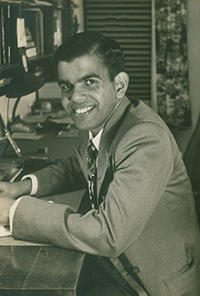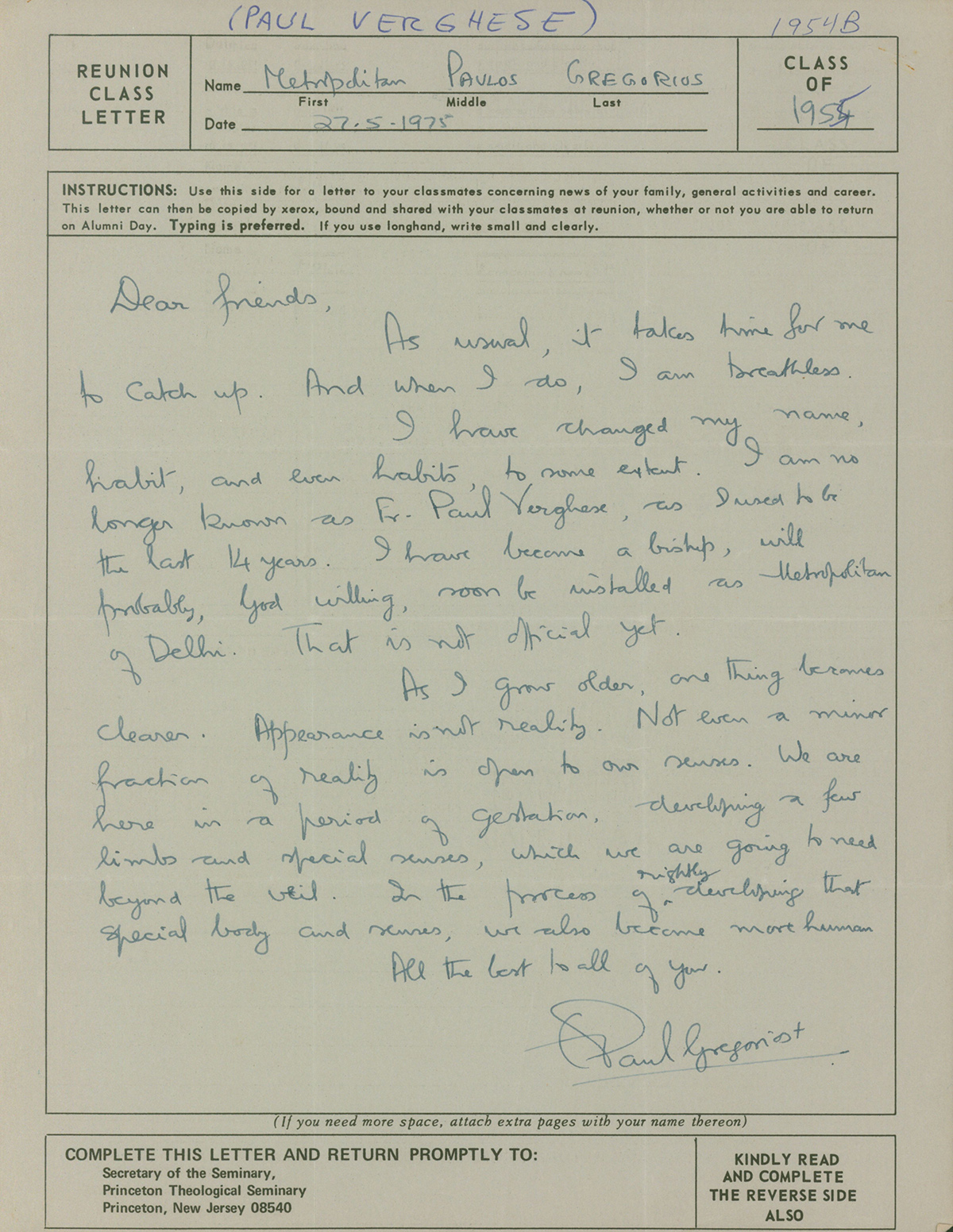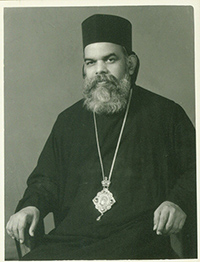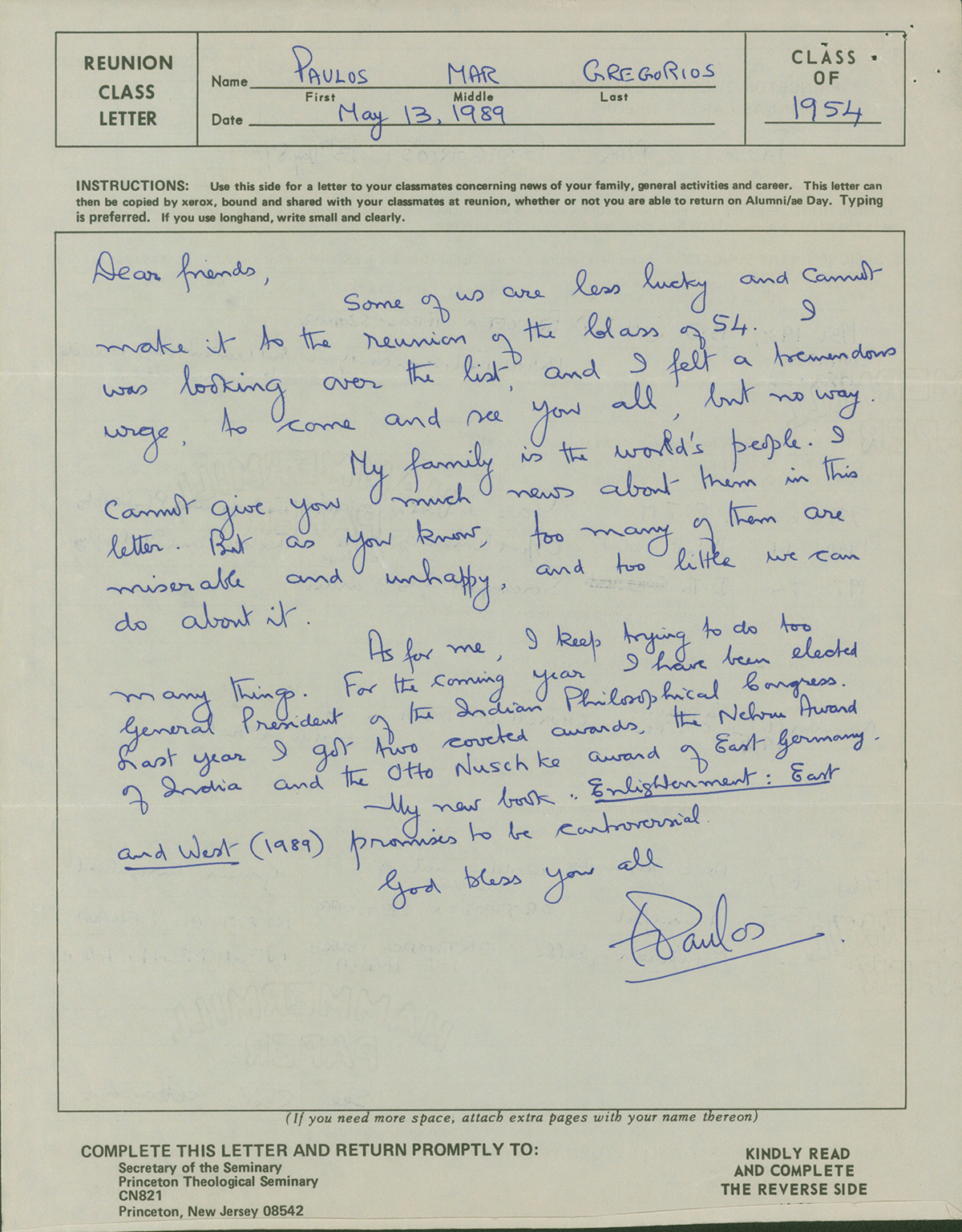It is not surprising that Paul Verghese’s lecture, “Thoughts on Liberation: James Reeb and Herbert Marcuse,” (audio recording also available) invoked philosopher and social critic Marcuse. Both Verghese and Marcuse drew upon science and technology, religion and philosophy, economics and political models to address societal issues of the 20th century. Verghese carefully avoided oversimplification of Marcuse’s writings as he challenged Marcuse’s utopian concepts with real world crises and a foundational belief that “Utopia is the kingdom of God.” A distinguished Princeton Seminary alumnus and contemporary of Reeb’s, Verghese empathized with aspects of Reeb’s personal faith struggle.
“We both looked for a faith that made it possible for us to care for our fellow-man without anxiety or aggression.”

Born in Tripunithura Kerala India August 9, 1922, T. Paul Verghese wrote that he “accepted the Lord as my personal Saviour at the age of 14.” His father was a schoolteacher, and the younger Verghese attended Government High School in Kerala from 1927 to 1937. He worked in journalism and business in India until 1947, becoming an active trade union leader. He then taught public school in Ethiopia from 1947 to 1950 before going to the United States, where he received a bachelor’s degree from Goshen College in Indiana in 1952 and studied at Oklahoma University and Union Theological Seminary in New York. He attended Princeton Theological Seminary, earning a Master of Divinity degree in 1954. He received a Master of Sacred Theology degree from Yale in 1968 and did further studies at Oxford and Muenster. He received his Doctorate in Theology from the Serampore University, West Bengal India, in 1976.
Verghese’s dissertation examined the writings of 4th century philosopher-bishop, Mar Gregorios of Nyssa, in the West Asian Province of Cappodocia, in present-day Turkey. Gregory of Nyssa’s teachings from the Asian-African Christian tradition provided the framework for much of Verghese’s work.
Associate General Secretary of the Student Christian Movement 1954 to 1956, Verghese was General Secretary of the Orthodox Student Movement 1955 to 1957. From 1956 to 1959 he worked as personal staff and advisor to Emperor Haile Selassie in Ethiopia, where he participated in education reform, promoted Indo-Ethiopian diplomatic relations, and lectured at Addis Ababa University. He was ordained to the priesthood in 1961.
Verghese_WCC_letter_1967IIHis global ecumenical ministry began in 1962 when he was appointed Associate General Secretary of the World Council of Churches and Director of the Division on Ecumenical Action, becoming the first Orthodox theologian on the WCC staff. He was instrumental in establishing dialogue between the Eastern Orthodox and Oriental Orthodox Churches, and his ministry reflected both his South Asian heritage and inter-religious consciousness.
“To be free thus for the Eastern Christian is much more than being liberated. It means becoming spontaneously creative, i.e. to be the originator of the good and the beautiful without being constrained externally or internally to do so.”
In 1967 Verghese left the WCC staff to become Principal of the Orthodox Theological Seminary at Kottayam, Kerala. He also established the Sophia Centre.
On February 16, 1975, Fr. Paul Verghese was consecrated with the name Paulos Mar Gregorios as Metropolitan Bishop in the Orthodox Syrian Church of the East. He led the newly formed Diocese of Delhi from 1976 until his death November 23, 1996.


He represented the Syrian Orthodox Church of Malabar as a delegate to the WCC’s fourth assembly in 1968 at Uppsala and later assemblies up to Canberra in 1991. He was a member of the WCC central and executive committees from 1975 to 1983 and was elected a WCC president from 1983 to 1991. He led WCC delegations to the UN General Assembly Special Sessions on Disarmament in 1983 and 1988. He chaired the 1979 World Conference on Faith, Science and the Future at the Massachusetts Institute of Technology with more than 400 participants, and was vice-president of the Christian Peace Conference from 1970 to 1990.
Mar Gregorios was a visiting Professor at Denver, Harvard, Wooster, and Princeton. He was a fellow at the Indian Institute of Advanced Study at Shimla, vice-president of the Kerala philosophical Congress, and president of the Indian Philosophical Congress. Paulos Mar Gregorios received numerous awards and honorary doctorates, including the Distinguished Alumnus Award, Princeton Theological Seminary, May 29, 1992.

He authored more than 100 books and articles and was proficient in several languages, modern and ancient, of Asia, Europe and Africa. An outspoken opponent of apartheid and colonialism, Verghese drew attention to the plight of stonecutters of Tughlakabad, Delhi, and the orphaned boys at Thalakodu, Kerala. He advocated radical social change in opposition to what he saw as racist Western political forces driving global economic development.
“Freedom means not simply freedoms from oppression, exploitation and enslavement, but also the capacity to stand up in dignity and to be the free creator of the good.”